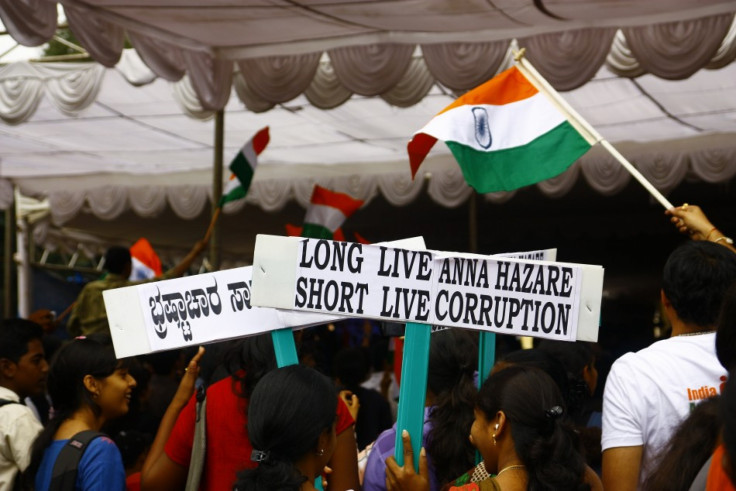Indian Activist Agrees to Two-Week Fast as Government Backs Down

An Indian anti-graft campaigner whose jailing sparked mass protests has accepted a police offer to fast in a New Delhi park for two weeks, an aide said Thursday morning, thrilling his followers.
Protests swelled across India Wednesday in support of Anna Hazare, a Gandhian-style activist who had refused to leave jail until he won permission to continue his fast until death at the Ramlila Maidan, a popular rallying site in the heart of old Delhi.
Crowds outside the Tihar jail where Hazare was staying erupted in joy at news of the deal, reached in the middle of the night, shouting his name "Anna" and "we are with you," singing, playing guitar and waving the Indian flag. He is expected to go to the protest ground in the afternoon.
"Anna wanted three weeks but ... has finally settled on two weeks," Kiran Bedi, a former police officer and current anti-corruption crusader, told Times Now television after announcing the deal on Twitter.
"None of us is looking at this as a victory," said Bedi, who had also been briefly arrested. "We are not playing games. We are doing this to move the country forward."
Beleaguered Prime Minister Manmohan Singh and his government had appeared at a loss over how to end the standoff. The arrest of Hazare on Tuesday after he rejected a police permit to only fast for three days sparked nationwide outrage and prompted lawmakers to block parliament proceedings.
"It exposes how far removed the Manmohan Singh-led government is from popular sentiment. Were elections to be held today, the UPA (Congress party-led coalition) would have struggled to hold on to power," The Times of India said in an editorial Thursday. The next national polls are in 2014.
The arrest and sudden about-turn to release him appeared to confirm a widespread feeling that Singh's government is cornered, clumsy and too riddled with scandal to govern Asia's third-largest economy effectively.
The focus now turns from the arrest to the fight against corruption, proving headaches for the government for weeks to come.
A weak political opposition means that the government should still survive the crisis, but it could further dim the prospect for economic reforms that have already been held back by policy paralysis and a raft of corruption scandals.
Bedi said the police had agreed to look at extending the permission to fast if needed after the two-week period.
The squat and slight 74-year-old Hazare fasted as tens of thousands of his followers gathered at key locations in Delhi, including outside the jail, and at the symbolic India Gate.
His arrest, followed by the brief arrests of about 2,600 followers in the capital alone, shocked many in a country with strong memories of Gandhi's independence battles against colonial rule with fasts and non-violent protests.
CANDLELIGHT VIGILS
Spurred on by messages on social networking sites, thousands of people held peaceful candlelight vigils through the night from the capital Delhi to the IT hub Hyderabad.
Singh, 78, who is widely criticized as out of touch, dismissed the fast by Hazare as "totally misconceived," sparking outrage as lawmakers cried "shame."
"We don't have faith in our government," said Sujeet, a young software engineer from the IT city of Gurgaon, as he protested at the tourist site of India Gate in the capital. "We are living in a democracy but only in letter, not in spirit."
Many of the crowd were young, with rucksacks on their backs, some with their faces painted. Others were older, decked out in outfits as worn by the bespectacled Hazare, with his trademark white cap and kurta, a long-time social activist who is often compared to independence leader Mahatma Gandhi.
Demonstrations are part of daily life in the towns and cities of India, a country of 1.2 billion people made up of a myriad of castes, religions and classes. But spontaneous and widespread protests are rare and the scale of this week's outpouring of public fury has taken the government by surprise.
Hazare became the unlikely thorn in the side of the Congress party-led coalition when he went on hunger strike in April. He called off that fast after the government promised to introduce a bill creating an anti-corruption ombudsman.
The legislation was presented in early August, but activists slammed the draft version as toothless because the prime minister and judges were exempt from probes.
Corruption plagues all walks of life in India and has brought down company executives, opposition politicians, judges and government ministers linked to multi-billion dollar scandals have outraged an increasingly vocal middle class.
"Corruption is just one aspect... inflation, public transport, costly fuel and urban housing, all have gone for a toss. It's high time we need transparent governance to ensure a better future," said Pawan Sinha, 36, a commercial artist in Mumbai.
(Editing by Nick Macfie and Sanjeev Miglani)
© Copyright Thomson Reuters 2024. All rights reserved.











